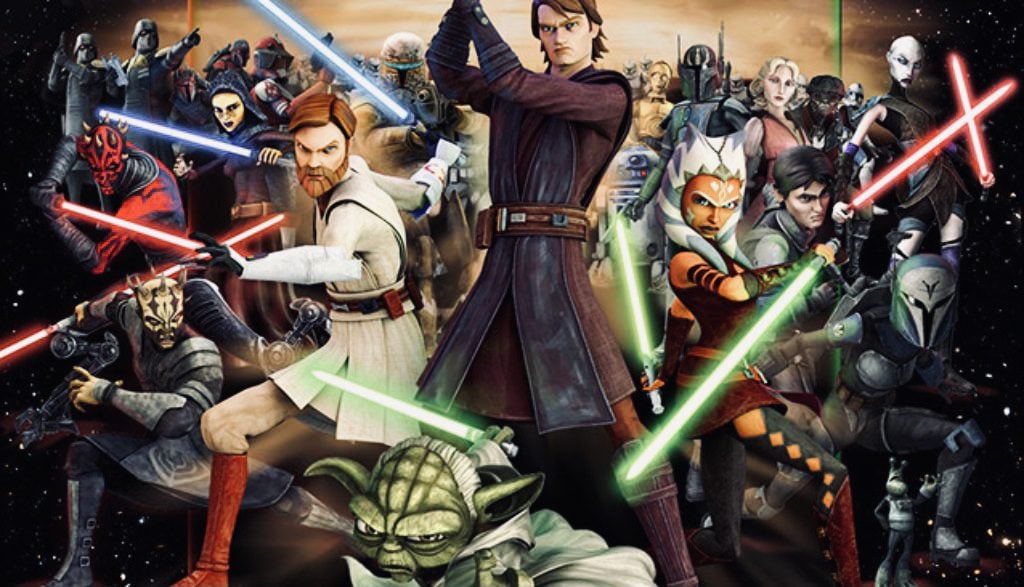Star Wars has been a franchise that I’ve long overlooked throughout my life, passing it off as mainstream science fiction that lacked the depth that I was accustomed to from the genre. A slightly snobbish perspective, I admit, but one that I felt especially justified in having after watching the original, prequel, and modern trilogies over recent years. They were (mostly) passable films, albeit with political themes and lore that were quite surface level. Still, where they (almost) always excelled was with their endearing cast of quirky characters, all of whom were performed with a grounded realism instead of the almost Shakespearean-esque mystique the genre often attracts. It’s for these characters that I would continue to give the films a chance, though each time I would come away feeling a sense of frustration having not gotten the full taste of this universe I was thrust into.
The problem, for me, was that the electric pace of these films always seemed to gloss over any real depth that could exist with these otherwise charismatically acted characters. The writing had heart, but always came across ever so hollow. Much of this was due to the constant need to progress to the next grand plot beat instead of allowing moments to breathe, especially those between characters. The plot came first, then the humour, then the spectacle. These pillars became all the more banal and uninspired with each Disney-led title in the modern trilogy. Although, Rian Johnson — irrespective of whatever fanboys may feel of the movie — did have a few interesting ideas with The Last Jedi in terms of questioning the wider lore and characters of the series; from the perspective of cinema, the film is better than most would have you believe.
Personally, I’m not one for plot. A good plot can only go so far if the characters that are driving it aren’t interesting and multi-faceted. Though I liked most of the heroes in the Star Wars movies, and adequately loathed its carousel of villains, their characterization and writing always fell short in one way or another. Their existence in films that never fully explored any of the deeper political mechanics of their universe didn’t help the matter, either (though the prequels at least tried. Badly, but they did). It’s then that I thought to expand beyond the films and try Star Wars in a different medium: video games. I played through Knights of the Old Republic, and to my surprise got all that I was missing from the Star Wars franchise from a lore and themes perspective than I ever did with the movies. I wrote a fairly lengthy piece on our sister website that goes deeper into my experience with the game, which you can read here.

It was after the completion of KOTOR that I felt the itch for more Star Wars beginning to fester. Having thoroughly enjoyed the introspective character study that was the fist two seasons of The Mandalorian, I thought to return to the show, only to find out the writers had completely butchered the third season. So then, with a flip of a coin deciding me watch Ahsoka over Andor, I went off to discover what that series was all about. Unfortunately, my takeaway was the same as how I react to most newly released Disney productions, that being an overwhelming “meh.” For as compelling as Rosario Dawson was as Ahsoka Tano, the writing, directing, and overall plot surrounding her character lacked any real substance for me to glom on to as an audience member. I was underwhelmed, and wrote some of the series’ flaws in another piece a few weeks ago. My itch for a good Star Wars story had yet to be scratched, and just as I was about to give up I came across a show that a friend had been urging me to watch for some time, but one I’d never given a proper chance to.
Star Wars: The Clone Wars is a series created by the man himself, George Lucas, and started off on Cartoon Network all the way back in 2008. It’s since jumped across streaming networks to then finally settle back home and be completed on Disney+. I had tried watching the series a couple years back, before I’d gotten into KOTOR, but struggled to make my way through more than five episodes primarily due to the juvenile writing that was clearly geared towards a younger audience. This time, however, I was determined to make my way through all seven seasons, especially after getting a taste of Ahsoka Tano’s character. Currently midway through the third season, and I can happily admit that I am thoroughly invested into the series and can sigh a breath of relief in acknowledging the show’s continued interest in its own history and politics; all propelled with intriguing stories and characters that retain that Star Wars heart.
It wasn’t all lightsaber-tinted roses, of course, as the first two seasons definitely had more than one instance that saw me roll my eyes and shake my head in vehement disapproval. There were a couple stand out moments, but it was clear that the series was finding its footing in terms of tone, writing, and depth. Once you clear past the midpoint of season two, however, things begin to get interesting. From deeper socioeconomic themes, to an exploration of character follies and power dynamics, The Clone Wars goes on to tackle a number of interesting topics the likes of which are rarely covered by Star Wars’ live-action counterparts.

It’s odd that in all my time with this colossal IP, having watched more than a dozen live-action titles across film and television, that the stories which resonated with me as an avid fan of science fiction were through animation and video games. Both KOTOR and The Clone Wars (so far through season three, though I know the series only gets better) offered the depth and lore that I was so dearly missing from the live-action stories. I wondered if it wasn’t a budgetary issue, though quickly nixed that notion when thinking about all the spectacular, VFX-riddled, and at times meaningless fight sequences throughout the nine blockbusters. I questioned whether it wasn’t a time issue seeing how films only have so much runtime to tell a cohesive narrative, but that argument doesn’t work when considering the more recent live-action shows, all of which now have the budgetary backing of Disney to boot. And for as much as I liked the quiet sombreness of The Mandalorian with Pedro Pascal’s captivating performance as the bounty hunter, its story didn’t expand further into the wider universe of Star Wars.
The Clone Wars continues to surprise me with each episode, showing me parts of Star Wars lore I’d never seen before, questioning different societal structures amongst a variety of different planets and peoples, all the while giving its characters enough time to be properly fleshed out. Previously, when asked what I preferred between Star Trek and Star Wars, I was always quick to answer with the former, believing it to be the superior property as far as true science fiction is considered. And though I doubt The Clone Wars will reach the heights of a Deep Space Nine, I will say that I am eagerly awaiting to see just how close it can get.

